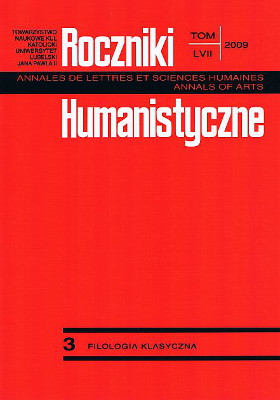Lucretia – “dux Romanae pudicitiae” or “mulier laudis avida”?
Abstract
In this essay the author discusses two different visions of Lucretia (Lucrece). For Roman writers – Livy, Cicero, Valerius Maximus and Seneca – she was the ideal incarnation of ancient Roman virtues: pudicitia, castitas, virilis animus, virtus. Early Christian writers – Tertullian, Jerome, Augustine – call up Lucretia’s deed in order to prove various points argued in their works. Ethical value of her famous deed, undeniable for ancient Romans, they accept only in so far as their religion allows them to, considering Christian examples to be much nobler.
References
Marrou H. I.: Historia wychowania w starożytności, tł. S. Łoś, Warszawa 1969.
Menghi M.: Introduzione, [w:] Tertulliano, De spectaculis. Ad martyras, a cura di M. Menghi, (Classici greci e latini), Milano 1995, s. VI-VII.
Stawecka K.: Virtus w piśmiennictwie przedcycerońskim, „Roczniki Humanistyczne” 13 (1968), z. 3, s. 73-92.
Copyright (c) 2009 Roczniki Humanistyczne

This work is licensed under a Creative Commons Attribution-NonCommercial-NoDerivatives 4.0 International License.





